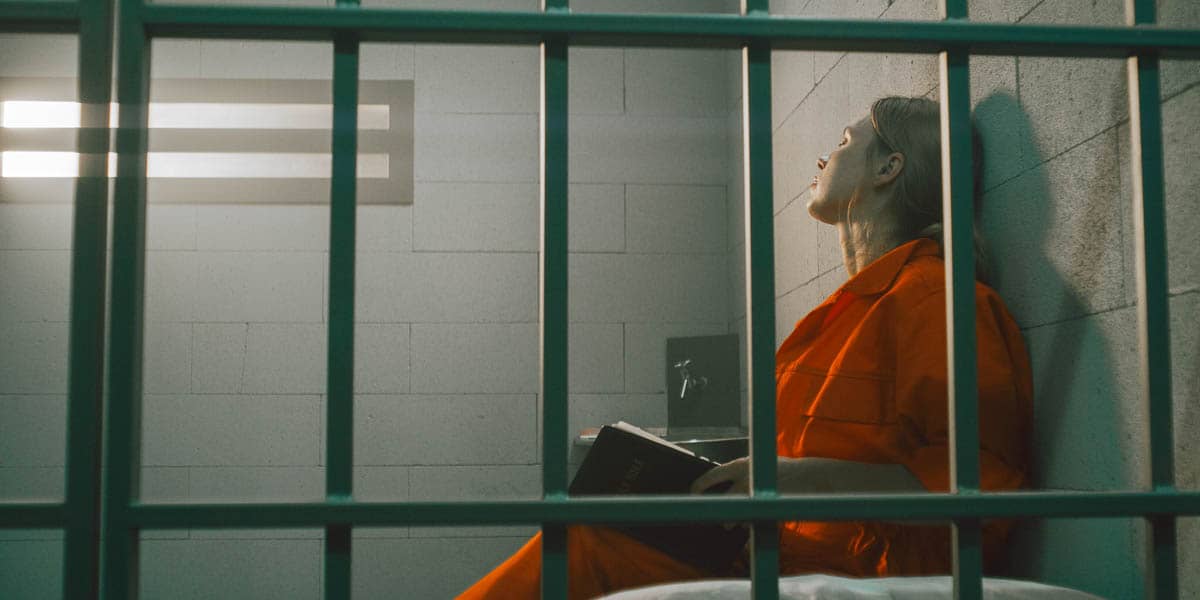Divorcing an Incarcerated Spouse

- Is it possible to divorce someone in prison?
- Incarceration as grounds for divorce
- How to serve an incarcerated spouse
- How dissolution of marriage differs when one spouse is jailed
When you decide to get a divorce and your spouse is in jail or prison, you may not be certain how to proceed. You can still get a divorce, but the process might look slightly different. Here's what you need to know.
Is it possible to get divorced if your spouse is in prison?
Yes, it is possible for a married couple to get a divorce when one spouse is in prison. However, divorcing an incarcerated spouse can be a complex and challenging process. It's important to understand the various legal and logistical issues that may arise.
There are several reasons why a spouse might want to divorce their jailed spouse. If the incarcerated spouse committed a serious crime and is serving a long sentence, the other spouse may feel that their marriage is irretrievably broken and that they can no longer continue to support their partner. Alternatively, the spouse may have other reasons for wanting to end the marriage, such as infidelity or simply growing apart.
Regardless of the reasons for divorce, it's important to recognize that divorcing an incarcerated spouse may be more difficult than a traditional divorce. In many cases, the incarcerated spouse may not have access to legal representation. Or, they may be difficult to contact. Divorce-related issues such as property division and child custody can be significantly more complicated when one spouse is incarcerated.
Complicated divorce? If you need a lawyer, we recommend scheduling a free call with our partner, Marble law. Book yours now.
Incarceration as grounds for divorce
Grounds for divorce are the legal reasons accepted by the court as a basis for ending a marriage. These grounds vary depending on the jurisdiction, but they generally fall into two categories: no-fault and fault grounds.
- No-fault grounds essentially mean that the marriage is ending because the two parties no longer wish to be married. In these cases, neither party is blamed for the breakdown of the relationship. The court doesn't need to consider any fault-based reasons for ending the marriage.
- Fault grounds refer to specific behaviors or actions by one spouse that are deemed to be unacceptable and that contributed to the breakdown of the marriage. Examples of fault grounds include adultery, physical abuse, drug addiction, and criminal behavior.
In fault states, which require a specific reason for the divorce, incarceration may be considered as one of the grounds for divorce. An incarcerated spouse's behavior may be viewed as a fault or wrongdoing severe enough to warrant a divorce.
How to serve divorce papers on an incarcerated spouse
Serving divorce papers on an incarcerated spouse can be a challenging process, as the spouse is not easily accessible and may not have a current address. Nevertheless, service of process is an essential step in initiating the divorce process.
Below are some general steps on how to serve divorce papers on an incarcerated spouse:
- Determine the prison location. The first step in serving divorce papers on an incarcerated spouse is to determine where they are located. You can usually find this information on the state Department of Corrections website for the state where your spouse is serving their sentence.
- Check state laws. Each state has specific laws governing how to serve divorce papers on an incarcerated spouse. You'll need to check the divorce laws in your state to make sure you're following the correct procedures.
- Contact the prison. Once you know the prison location, you'll need to contact the prison to ask about their procedures for serving legal papers on inmates. Some prisons have specific rules and requirements regarding serving divorce forms on inmates, so it's important to get this information before proceeding.
- Prepare the divorce papers. Next, you'll need to prepare the divorce papers. These documents will need to be completed in accordance with your state's specific requirements.
- Arrange for service. Your next step is to arrange for the service of the divorce papers on your incarcerated spouse. This may involve sending the papers to the prison, or it may require you to have a process server appear in person at the prison to serve the papers.
- Wait for a response. After serving the divorce papers, you'll need to wait for a response from your spouse. Since they are incarcerated, their response time may be delayed, so it's important to allow enough time for them to respond.
Learn the difference between a default judgment and an uncontested divorce.
How is the divorce process different when one spouse is incarcerated?
The divorce process can be significantly different when one spouse is incarcerated. Below is a side-by-side comparison of some of the key differences:
|
Divorce Issue |
Traditional Divorce |
Divorce with Incarcerated Spouse |
|
Spouse participation |
Both spouses can fully participate in the divorce process |
The incarcerated spouse's participation may be limited, as they may not have regular access to legal counsel or the ability to appear in court |
|
Child-related issues |
Spouses have an equal say in child custody and support |
The non-incarcerated spouse may have more control over child custody and support decisions, as the incarcerated spouse's ability to parent is limited |
|
Property division |
Spouses can work together to divide property |
The property division process may be different, as the incarcerated spouse may not have access to assets accumulated during the marriage or the ability to easily discuss division of property |
|
Timeline |
Divorce can be completed within a few months |
The divorce process may be prolonged due to challenges serving papers, limited communication with the incarcerated spouse, and other complications |
|
Legal representation |
Both spouses can hire legal counsel to represent them |
The incarcerated spouse may have limited access to legal counsel, which can affect the fairness of the divorce proceedings |
More about divorcing an incarcerated spouse
Could my spouse hire a lawyer or attend divorce court hearings while incarcerated?
Yes, an incarcerated person can hire a lawyer and attend divorce court hearings. However, the process may be more complicated than it is for a non-incarcerated person due to restrictions on the incarcerated person's ability to communicate and travel.
Can an incarcerated person file for divorce?
Yes, an incarcerated person can file a divorce petition. The fact that a person is incarcerated does not prevent them from initiating divorce proceedings. However, logistical challenges may arise when an incarcerated person files for divorce. For example, the person may have difficulty obtaining legal representation or serving notice of the divorce on their spouse. They may also have limited access to communication tools and other resources they need to navigate the divorce process.
Does an incarcerated person have any say about child custody?
An incarcerated person can have a say in child custody decisions, but their ability to participate in the process may be limited. When making custody decisions, the court's primary consideration is the best interests of the child. This means the court will consider a wide range of factors including the needs of the child, the ability of each parent to provide for the child's well-being, and the child's relationship with each parent.
In cases where one parent is incarcerated, the court may take several factors into account when deciding on child custody. These factors may include the length of the parent's sentence, their access to resources that would enable them to provide for the child, and the impact of the parent's absence on the child. Depending on the situation, the incarcerated parent may have limited opportunities to participate in the custody decision-making process.
Could an incarcerated person be ordered to pay child support?
Yes, an incarcerated person could be ordered to pay child support. Child support is determined based on the incomes of both parents and the needs of the child. If the incarcerated parent has an income, they may be required to pay child support even if they are not physically present in the child's life.
💡 Quick Tip: We know Hello Divorce's process may not be a fit for everyone. That is why we teamed up with Marble to give you 10% off if you are considering using a lawyer. Learn more.
Suggested: Contested and Uncontested Divorce: How They Differ
FAQs
Can I divorce my spouse if they are incarcerated?
Yes. You can still file for divorce while your spouse is in prison.
How do I serve divorce papers on an incarcerated spouse?
Service is handled through the prison warden or legal office.
Will my incarcerated spouse have to appear in court?
They usually participate by phone, video, or through an attorney.
Does incarceration count as grounds for divorce?
Some states list it, but no-fault divorce is available in most places.
Can an incarcerated spouse contest the divorce?
Yes. They can respond, request hearings, or hire a lawyer.
Does incarceration affect child custody or support?
Yes. Courts consider the child’s best interests and may adjust custody and support.
Step-by-Step: Divorcing an Incarcerated Spouse
Prepare your divorce paperwork
Complete the petition and necessary forms for your state.
File your forms with the court
Submit documents and pay fees or apply for a waiver.
Serve your incarcerated spouse
Deliver papers to the prison via the warden or legal office.
Wait for your spouse’s response
They may answer in writing or through legal representation.
Attend hearings if required
Expect participation by phone, video, or attorney representation.
Resolve custody and support issues
Courts will make decisions with the child’s best interests in mind.
Finalize the divorce
The judge signs the final decree once all steps are complete.



